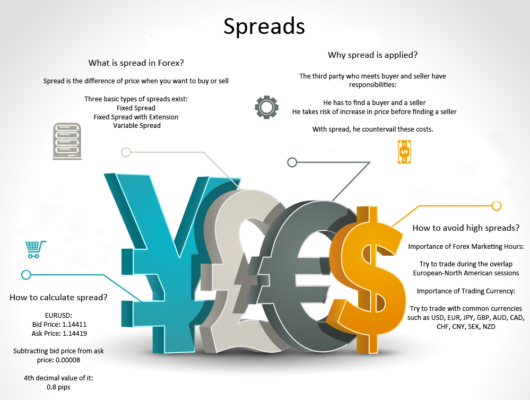The spread is the difference between the ask and bid price on a trade. A low value means that there is a small difference between the bid and the ask price of a currency pair. An increase usually means volatile market conditions or liquidity in the market. Spreads usually widen during less frequent trading hours, volatile times, or before news events.
The interbank market is where the prices originate from for most of the major brokers. Spreads are quoted as fractions of a pip (fractional pips).
The spread is how no-commission brokers make a profit. The cost is built into the bid-ask prices of each currency pair you trade. This is done instead of paying a commission fee per trade. While some brokers advertise lower spreads, they are more expensive because they charge higher commissions. Because spreads change during periods, it is best to calculate Average Spread data over a more extended period (monthly spread data) and commissions (spread + commission). That is how you avoid higher average spreads. You shouldn't look at the minimum spread but calculate the average.
How does it work in Forex?
The bid price is the exchange rate at which you are willing to sell a currency and the price a broker is willing to pay. The ask price is the price at which you buy the same currency and the price at which a broker is willing to sell it. The bid price is generally lower than the ask price. When you buy a Currency Pair from a broker, you buy the base currency and sell the Quote Currency. When you sell the currency pair, you sell the base and receive the quote currency. Currency pairs are quoted based on their bid and ask prices.
A currency quote is the value of one currency compared to another foreign currency. These two currencies are known as the base currency and the quote currency. The base currency is always the first currency listed. The second one listed is the quote currency.
How are spreads calculated?
Spreads are a key figure when determining your cost. There are two parts to how the spread is calculated. This price difference is calculated in pips. The width of the spread is based on factors such as trading volume, market volatility, and liquidity.
Pip stands for “percentage in points.” In Forex, 1 pip usually equals 1 point movement in market value. This is based on the fourth decimal place of your currency pair.
First, there is an interbank spread. This is the difference between the bank that wants to buy the currency at a set price and the selling bank's offer.
Second is the specific broker. Retail traders use brokers for order execution, so the broker adds a markup spread above the Raw Spread. The way forex and CFD brokers make money depends on the available execution methods and their business model.
To calculate it, you need to determine the difference between the buy and the sell price in pips. All you need to do is subtract the bid price of a currency pair from the ask price.
1 pip is equal to 0.0001 for most currency pairs.
An example of a 1 pip for USD/EUR would be 1.1061/1.1062.
How to Spread Bet in Forex?
Spread betting is only available in certain countries like the United Kingdom. A spread bet is where traders “bet” on the direction of the price, up or down. This way, spread betting brokers are a way to cut taxes for traders.
What is considered a good spread?
Spreads are considered good when they are as close to zero as possible. Those usually have an average of below 1 pip. An example of a good spread would be 0.5 pips for a currency pair. It is also important to base your calculations on average price data over an extended period.
What is the lowest spread in Forex?
A low spread is when the difference between the bid and ask price is small. It is best to trade when the spreads are low like during the major forex sessions. Low spread usually means that liquidity is high and volatility is low.
0 pips is the lowest (zero) in forex. 0 pips spreads are offered by ECN-STP brokers. To calculate which broker has lower spreads, it is essential to calculate all trading costs. While some brokers offer zero spreads, they still charge per-trade commissions, which could cost you more.
What is a zero account?
Zero Spread Trading Account is a forex trading account with no difference between the bid and ask price or the spread is close to zero. Spreads can widen depending on the trading conditions, account type, and whether or not the broker charges commissions.
How To Compare Low Spread Accounts?
To compare low-spread forex accounts, you need to consider factors such as commissions per trade, spreads, trading platforms, regulation, security, and currency pairs offered.
Raw Account vs. Standard Account
In Forex, a Standard Account refers to a standard lot size, which is 100,000 units of currency. A Raw Spreads account refers to the cost where the broker doesn't add a price markup but offers the price directly from liquidity providers.
How does a good spread make a difference?
The lower the spread, the cheaper it is to place a trade order. A smaller spread means low trading costs. Incorporating tighter spread into your trading strategy is a key way to make higher profits.
On the other hand, make sure you check what other commissions your broker charges. Some charge higher commissions to make a profit.
Scalping and Spreads
Finding a broker with low spreads is significant for scalping. Scalping is a strategy that involves profiting off of small price changes. As a result, traders make a high number of trades. Traders need fast order execution and a strict exit strategy as one significant loss could erase the many small gains.
